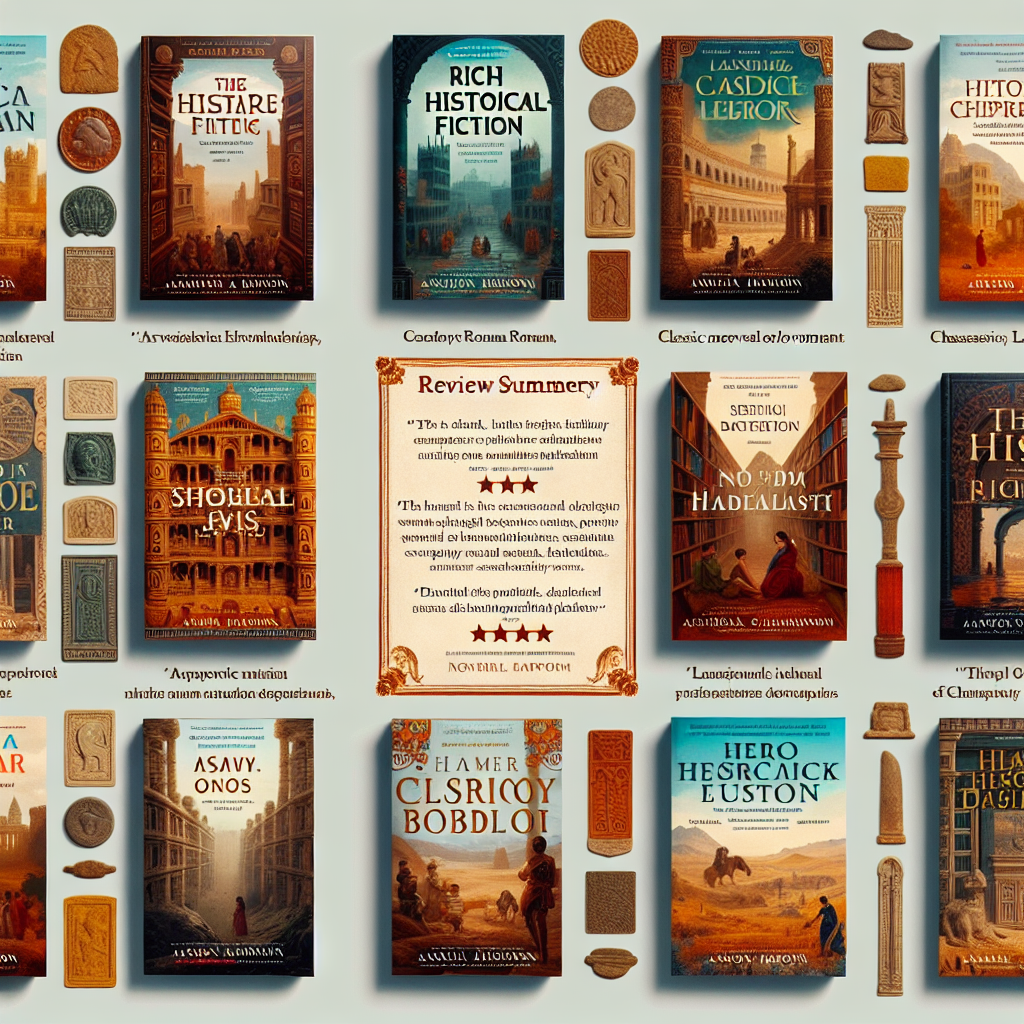As an Amazon Associate I earn from qualifying purchases.
# Top Historical Fiction Book Reviews
Historical fiction offers a unique blend of education and entertainment, allowing readers to immerse themselves in the past in a way that history books alone cannot. This genre provides a narrative to the names, dates, and events that shaped our world, filling in the gaps with human emotion, personal conflict, and the minutiae of daily life in bygone eras. In this article, we delve into some of the top historical fiction books, providing reviews that highlight their significance, accuracy, and ability to captivate.
## The Pillars of the Earth by Ken Follett
Ken Follett's masterpiece, “The Pillars of the Earth,” transports readers to 12th century England, a time of anarchy, religious strife, and architectural innovation. The novel centers around the construction of a cathedral in the fictional town of Kingsbridge and follows several characters whose lives intertwine with the building's fate. Follett meticulously researched medieval architecture and English history, ensuring the setting and events, though fictionalized, remain grounded in historical accuracy.
What sets this novel apart is its ability to make the reader care deeply about the construction of a cathedral, an endeavor that, on the surface, might seem mundane. Through compelling character development and intricate plot lines, Follett explores themes of ambition, power, revenge, and love. “The Pillars of the Earth” is not just a story about building a cathedral; it's a saga of human resilience and ingenuity.
## All the Light We Cannot See by Anthony Doerr
Set during World War II, “All the Light We Cannot See” by Anthony Doerr is a poignant narrative that intertwines the lives of a blind French girl and a German soldier. The novel beautifully captures the devastation of war and the beauty that can sometimes be found in the midst of it. Doerr's prose is lyrical and evocative, painting vivid pictures of the French coastal town of Saint-Malo and the war-torn landscapes of Europe.
The novel's dual perspective allows readers to see the war from both sides, providing a nuanced understanding of human nature and the complexities of conflict. Doerr's meticulous research into the era, from the science of radio to the occupation of France, lends authenticity to the narrative, making it not only a compelling story but also a tribute to the resilience of the human spirit.
## The Book Thief by Markus Zusak
The Book Thief” by Markus Zusak offers a unique perspective on World War II, narrated by Death itself. The story follows Liesel Meminger, a young girl living with a foster family in Nazi Germany, who finds solace in stealing books and sharing them with her neighbors and the Jewish man hiding in her basement. Zusak's novel is a testament to the power of words and stories to provide hope and escape during the darkest times.
What makes “The Book Thief” stand out is its innovative narration and the depth of its characters. Zusak's portrayal of Death as a curious observer of humanity adds a layer of philosophical reflection to the narrative, inviting readers to ponder life, death, and the impact of our choices. The historical backdrop of Nazi Germany is rendered with care, capturing the fear, propaganda, and moments of resistance that defined the era.
## Wolf Hall by Hilary Mantel
Hilary Mantel's “Wolf Hall” is a riveting account of the rise of Thomas Cromwell in the court of Henry VIII. Mantel breathes life into the historical figure, portraying him as a complex, ambitious, and ultimately sympathetic character. The novel delves into the political intrigue, religious upheaval, and personal vendettas of Tudor England, offering a fresh perspective on a well-trodden period of history.
Mantel's writing is sharp and immersive, drawing readers into the machinations of the Tudor court with a modern sensibility that makes the 16th-century setting accessible and engaging. “Wolf Hall” is not only a character study of Cromwell but also an exploration of power, loyalty, and the human capacity for adaptation and survival. Mantel's extensive research is evident in every detail, making “Wolf Hall” a masterpiece of historical fiction.
## Conclusion
Historical fiction serves as a bridge between the past and present, offering insights into the human condition through the lens of history. The novels reviewed here represent some of the best the genre has to offer, each providing a unique perspective on different periods and events. From the architectural feats of the Middle Ages to the moral complexities of World War II, these books invite readers to explore history in a deeply personal and engaging way.
Whether you're a history buff or simply looking for a compelling story, historical fiction offers a rich and varied landscape to explore. The books reviewed above are just a starting point, each opening a window into a different era. Through meticulous research, vivid storytelling, and complex character development, these novels remind us that while the past may be a foreign country, the emotions and struggles of those who lived it are not so different from our own.

Amazon and the Amazon logo are trademarks of Amazon.com, Inc, or its affiliates.






















































